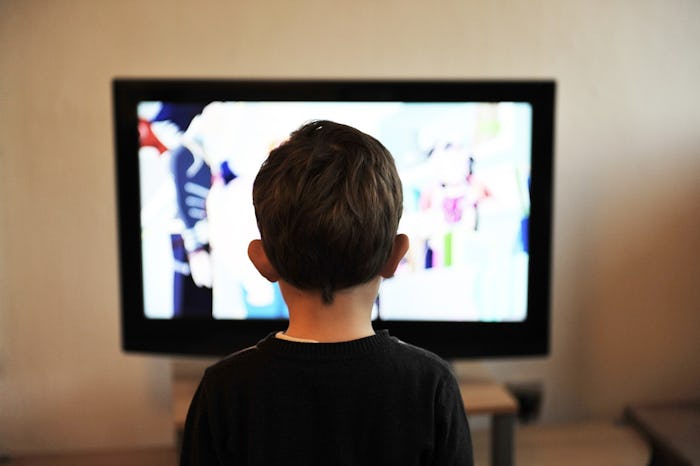Life
7 Ways Watching A Scary Movie Affects Your Kid Later In Life
Whether you grew up peeking through your fingers or watching with eyes wide open, horror films can have a huge impact on you. But are frightful flicks simply harmless works of fiction? Though the probability of monsters being under your bed has dwindled as you've grown older, if you're a parent, your concerns have probably shifted towards your child. It may surprise you that there are actually several ways watching a scary movie affects your kid later in life. Does this mean that you should start censoring what your family watches? Not necessarily.
Obviously not everyone who saw scary movies is left with emotional scars, but you have to admit that you've had at least one moment in your adult life where you wondered what lurked behind the shower curtain in your bathroom late at night. As an adult, you can laugh off these momentary fears because you know better. However, some might argue that children could be unable to separate the imaginary world from the real one.
So, will movie night occasionally include monster films and spilled popcorn or will channels be blocked and horror flicks be banned? That choice is up to you, and to help inform your decision making, here are some ways watching a scary movie affects your kid later in life
1They Could Struggle With Reality
Though most grown-ups can tell the difference between fact and fiction, children arguably seem to have more difficulty with that. One scientific study backs that notion up, too. Dr. Joanne Cantor, professor of communication arts at the University of Wisconsin, and Dr. Kristen Harrison, professor of communication studies at the University of Michigan, published their research in Media Psychology where they noted, "children who did not intend to view but went along with others and younger children were most at risk for experiencing enduring fright effects," What do some of these effects include? As noted in the study, the top effects were, "fear of losing control, fear of dying, [and] 'unreality' feeling." Perhaps a happy compromise would be to have a long talk with your kids about understanding the differences between movies and real life.
2Real Disorders Can Develop
You might think that mental health disorders are more of an adult thing, but they can happen in children, too.Dr. Daniel S. Schechter, a child psychiatrist, spoke at the American Academy of Child & Adolescent Psychiatry conference where he noted that "children who watch horror films may be more likely to develop anxiety, sleep disorders, and self-endangering behaviors." The very real possibility of a child developing a mental health issue should be taken into consideration when selecting films to watch.
3They May Become Aggressive
Kids are notorious for copying what they see other people do. A child imitating dance moves seen on television can be funny, but recreating fight scenes from horror films aren't really a laughing matter. Dr. R. Y. Langham, a family psychologist, told the Association for Youth, Children and Natural Psychology (AYCNP) -th at school and home due to their inability to understand the consequences they have in the real world. For instance, my son thinks he's invincible and doesn't get why he can't perform the same stunts the superheroes in films do.
4Clinging Can Occur
Again, children seem to be more affected by scary movies than adults. Even though I'll admit to hiding behind my partner when a spooky scene is playing, kids definitely feel this to a far greater extent. As Cantor and Harrison noted, "crying, nausea, [and] clinging tendencies," were reported in children after having viewed films with unsettling themes. Parents are the ones who know their children best, so if you think your kid might fall under this umbrella, maybe scary movies should stay on the shelf.
5Their Problem-Solving Skills Shift
One of the things I was most surprised to learn about was how a child's problem-solving skills can be affected by internalizing the situations they see in media. In an interview with The New York Times, Cantor said watching gory or frightening movies, "makes kids feel they can use violence to solve a problem. It increases desensitization." How often do horror flicks bring resolution without the characters having to use violence to survive? As a fan of The Walking Dead and all things sci-fi and comic-related, I can tell you it's a rarity if not impossible.
6They Can Become Numb
Pretty much everyone grew up being told that, "sharing is caring," but could watching a few frightful flicks change that for a child? Dr. Brad Bushman, a social psychologist at the University of Ohio, said in an interview with NPR that watching on-screen violence can negatively affect a young person's tendency to be compassionate. This could be something as simple as laughing instead of helping when someone trips or it could lead to what Bushman refers to as an, "emotional numbness." Though not much research has gone into whether these changes can be revered as there is into the effects themselves, parents will have to weigh the pros and cons for themselves.
7They're Prone To Absolutes
Not everything in this world is simple or black-and-white like things are on the silver screen, but children may not grasp that concept. Dr. Michelle Garrison, principal investigator at Seattle Children's Research Institute Center for Child Health, Behavior, and Development, told CNN that, "if a child sees himself as the 'good guy,' then anyone who disagrees with him must be a 'bad guy,'" which mirrors what they see in scary movies where most premises revolve around a hero defeating a monster. On the flip side, "if a child sees himself as a 'bad guy,' then it's no longer about choices that can change." Learning how to decipher right from wrong and take ownership of one's actions are important lessons to teach children, and it seems like horror films could be an interference.
